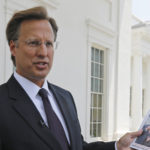The Republican Party Must Alter Its Message to Survive
Recently, Politico published a piece detailing a reality that many have known for years. The article, entitled “The GOP Is Dying Off. Literally.” explains how the Republican Party has relied too heavily on white and elderly voters over the years, which has so often led to defeat. The numbers are certainly not in the party’s favor if they wish to depend on the same demographics in future presidential elections.
While Politico focuses more on the mathematics and statistics of the situation, what are more important are the tactics which have led the GOP to its current predicament. Even though the Republican Party found success discussing social issues in federal elections from 1980 through 2004, it has apparently not discovered that the population’s opinions have shifted in a more libertarian direction. Once-fond memories of the “good old days” of the nuclear family are long gone, as new lifestyles have come into the mainstream.
This would not be the first time that one of the major parties has been forced to adapt. The country’s often-changing political beliefs have resulted in a constant pendulum swing. Ideologies have historically trumped party identifications in causing voters to choose one presidential candidate over the other.
Prior to the turn of the 20th century, the US had been overall a more “conservative” country with minimal expansions in government power. Northern Republicans controlled political discourse, as the newly-formed GOP won 11 of 13 elections from 1860 through 1908. The only 2 Democratic victories came from Grover Cleveland, one of the most small-government Presidents.
During this period, the Democratic Party began to differentiate itself by running liberal William Jennings Bryan in 1896, 1900 and 1908. While Bryan’s percentage of the popular vote shrunk in each election, this could be more attributed to the Republican Party co-opting more progressive ideals by selecting candidates like Theodore Roosevelt in 1904 and William Howard Taft in 1908.
After decades of success, the Republicans suffered their first internal split in 1912, as Roosevelt and Taft ran against each other, allowing liberal Democrat Woodrow Wilson to prevail in a three-man race. Wilson’s election represented the largest amount of power which had been given to American liberals to that point, and he began to lay the groundwork for large social programs.
Though the country felt a small swing back to conservatism with the elections of Harding, Coolidge and Hoover, the liberal tidal wave had already encompassed the nation, and the onset of the Great Depression led to the election of Franklin Roosevelt in 1932. Democrats, running on the legacy of Roosevelt, would win 8 out of the next 12 elections, with the only losses coming to World War II hero and moderate Dwight Eisenhower and his moderate Vice President Richard Nixon.
As several losing Republican candidates offered only a mild split from the Democrats during this era, only one suggested a clear shift in direction: Barry Goldwater. While Goldwater lost in a landslide in 1964, his campaign laid out the framework for a new conservative revolution; one that would not-so-coincidentally be led by one of Goldwater’s confidantes during the campaign, Ronald Reagan.
The American people had grown tired of the decades of liberal policies instituted under mostly Democrats, and they turned to Reagan in 1980. This desire for small government pervaded the 1980s and lasted through 2004. Bill Clinton was only able to defeat incumbent George HW Bush by presenting himself as a “conservative Democrat.” George W Bush used the aura of Reagan to narrowly achieve victory twice, until opinion once again shifted.
Voters, particularly those younger ones, were looking for something new when they voted for Barack Obama in 2008. Republicans had an opportunity to answer these complaints in 2012, but instead ran Mitt Romney, a candidate who epitomized the same failed Republican attempts of the Roosevelt era: a nominee who offered nothing novel or different.
It is for this reason that Republicans must find a new path to the presidency in 2016. They must not attempt to merely resurrect Reagan’s 1980 platform and think that this will win the White House. While the more broad message of small government should stay the same, the contemporary twist is what will make the difference. By incorporating more libertarian ideals, the Republican Party can re-invent itself by exemplifying what it has always claimed it has. Not only will this lead to more election victories, it too will lead to more personal freedom and individual liberty, creating a new generation of voters which can extol the principles upon which the country was founded.





1 comment